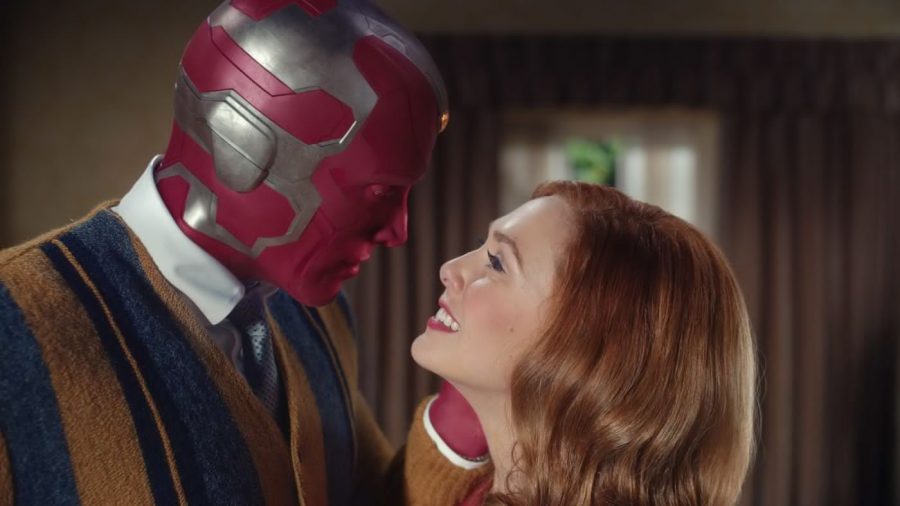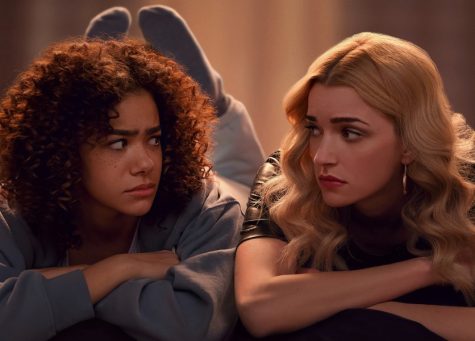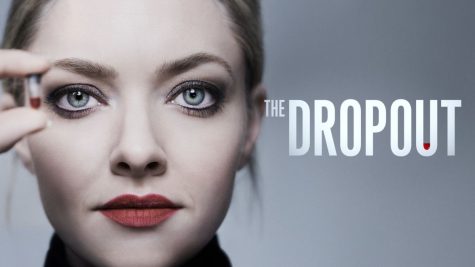Marvel’s “WandaVision” has potential, but lacks in action

Wanda (Elizabeth Olsen) and her husband Vision (Paul Bettany) share a moment of delight.
When picturing a Marvel superhero, most would imagine their favorite characters partaking in fast-paced action scenes, consisting of epic battles where the heroes always defeat the villains and save the day—not trapped in a sitcom making corny jokes. So when Disney+ released WandaVision on January 15, a show centered around two Avengers doing just that, I wasn’t sure what to expect. In the end, what I found was a unique show presenting an interesting premise and intriguing possibilities for future episodes, if the viewer can overcome its initially slow pace.
With three newly released episodes, Marvel’s WandaVision follows the misadventures of Wanda (Elizabeth Olsen) and her android husband Vision (Paul Bettany) as they attempt to navigate a normal life through the suburbs. Whether it be a dinner party gone wrong, a disorganized talent show, or an unexpected pregnancy, the viewers experience the couple’s journey alongside them and the characters they meet along the way.
For each major milestone Wanda and Vision make, the show’s style shifts forward a decade. Taking clear inspiration from classics such as I Love Lucy and The Brady Bunch, the series spoofs popular sitcoms throughout the years, making each episode unique in both its cinematography and comedic timing. The changes in outfits and household furnishing are enjoyable to observe while the screen substitutes its black and white film for full color, all accompanied by plenty of one-liners and a cheerful laugh track.
However, beneath the show’s good-natured hijinks rests a darker undertone, one which implies that the lives of these characters are not what they seem. Each episode leaves behind a few more cracks that threaten to shatter the show’s perfect cookie-cutter image, such as deliberately placed objects appearing in color despite the black and white background or men in beekeeper suits watching from the sewers. In these moments, the show succeeds in tainting its cheery facade with something much more sinister, leaving the viewer with the sinking feeling that something is not right.
The mystery of the show creates a feeling of intrigue for the watchers, sparking questions as to what each offputting scene could possibly mean for the characters and their story. As Wanda and Vision become more attuned to the strangeness surrounding them, viewers are encouraged to search for more clues and come up with theories as to what may be happening behind the scenes, making for an immersive experience as a viewer.
Yet despite its creativity and intrigue, WandaVision itself can be confusing to follow and at times almost boring. Much of the actual plot and mystery doesn’t even become relevant until the third episode. Despite each episode’s half-hour length, it still feels as though there is too much filler to muster through in order to get to the main point of the story, especially the second time around. There is one strange moment in the first episode that hints at the larger plot, but it is so irregular to the flow as a whole that it feels jarring rather than suspenseful, and its briefness makes it almost forgettable.
Additionally, this prolonged start at first gives off the impression that the entire show is simply a spoof on a 1950s sitcom rather than one taking inspiration from old sitcoms as a whole. For incoming viewers without a sense of the overall themes and plot beforehand, the show’s concept can come across as completely random. I feel a more concise pilot with extra “cracks” to look for would’ve helped to properly set the show’s tone and leave viewers with a sense of excitement rather than confusion. Instead, potential viewers must watch the first three episodes in order to get a true feel for the show before deciding whether or not to continue.
Despite these drawbacks, WandaVision still shows great potential as a show with its hints at a much greater mystery and complex plot than what appears on the surface. Yet, I feel that the show still needs to find its groove, as it often struggles to find a balance between its darker themes and light-hearted comedy.
Ultimately, WandaVision is a solid show with a compelling mystery and engaging characters, making it easy for viewers to become intrigued and want to tune in for the next episode; though it may take some until the third to want to do so. Although the show can seem overly cheesy or dramatized at times, it is very much worth a try for fans of shows like Agent Carter or Agents of S.H.I.E.L.D, as well as more casual Marvel watchers.
8.5/10











Noreen Duronio • Jan 29, 2021 at 7:53 pm
This is a great article written concisely and entertainingly.